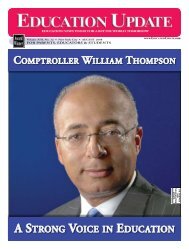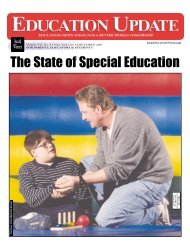18 <strong>Education</strong> update ■ For Parents, Educators & Students ■ DECEMBER 2006New Harlem Charter SchoolOpens Amid Praiseby Sybil MaiminIts name, Harlem Success Academy, is botha promise and a challenge. Opened in the fallof 2006 with a kindergarten and first grade andplans to expand through fifth grade (admissionby lottery), this academically rigorous charterschool boasts high profile leadership—executivedirector Eva Moskowitz was the talented andoften feisty chair of the New York City Council’s<strong>Education</strong> Committee, principal Iris Nelson wonthe prestigious Pathfinder Reward for turninglow-performing PS 65Q in Queens into a highperformingschool, and stock picking guru andhedge fund manager Joel Greenblatt and partnerJohn Petry contribute the significant differencebetween public monies and the school’s operatingbudget. Nelson admits to “pressure from manyplaces. Failure is not an option,” she exclaims.“We made a commitment to succeed.”Attesting to its importance as a potential modelof good practices and to the celebrity of its founders,a recent opening celebration was attended byover 200 superintendents, principals, public andcharter sector educators, city officials, parents,and boosters. New York City Schools ChancellorJoel Klein delivered an impassioned and supportiveaddress. Acknowledging that he andMoskowitz had often been at loggerheads, henonetheless admitted he “admires Eva’s relentlessfight for kids that need education which forfar too long this city and nation has denied them.”He said, “Everyone tells you how to do it ineducation, and I say, show me, don’t tell me.” Tohis surprise, “Eva fooled me—she is doing it, thehard work of transforming education.” Saying, “Iwant this school to succeed. . . . We need schoolslike this that will succeed to the highest level,” hedecried the “soft bigotry of low expectations, thegrowing gap between black and white,” and the“cap on excellence and opportunity in our city.”The curriculum at Harlem Success Academyis based on Success for All, a widely used wholeschool reform program that focuses on languageand literacy and emphasizes cooperative learning,peer teams, constant coaching, monitoring, andassessments, and data-driven targeted instruction.Its mantra is “Every child can succeed.”Highly experienced trainers thoroughly prepareHarlem Success staff to utilize the reading, math,and family support portions of the program.Explaining the favorable outcomes at PS 65Q,Nelson says, “We were able to put together sucha true implementation of the program, to fine tuneit and take it to a higher level that we got incredibleresults. We hope to do the same thing here.”During the first months of Harlem Success, readingscores have been impressive. Explaining thatall students, even outstanding ones, are tutoredtwenty minutes each day, Nelson muses, “It’s allabout movement. Everyone can go to a higherlevel.” Harlem Success parents agree by contractto read one book a night to their children.Moskowitz explains compliance is encouragedby providing reading lists, ensuring local branchlibraries have recommended books, sendingphone message reminders, posting class totals ofbooks read, and giving small gifts of appreciationto parents. Parent to student reading has gonefrom thirty to ninety-nine percent, and in threemonths 18,077 books have been read. MichelForging Bonds of Unity AmongYoung People Around the WorldBefore CollegeThere’sBy Liza YoungAThe audience was a mix of Americans fromthe Bronx, NY; Tucson, Arizona; Salt Lake City,Utah; Israeli, Druze and Arabs, but the bondsof friendship and empathy were ubiquitous at arecent luncheon at the Sutton Place Synagogue—under the leadership of Rabbi Allan Shranz—highlighting events at this year’s America IsraelFriendship League’s (AIFL) Youth AmbassadorStudent Exchange (YASE), a program initiatedin 1977 further the AIFL mission of fostering in New York and the Holocaust Museum infriendship and cultural understanding between Washington D.C., and attended a reunion of pastthe two nations.participants in the youth exchange program, heldThis year one hundred high school students in Washington D.C. The common theme amongfrom Israel and America had the opportunity to be the 120 alumni at the reunion was that the programhad a positive, life changing impact on theira part of the culturally and intellectually rich program.Israeli high school students, accompanied perspectives, beliefs, and self-confidence levels.by trained chaperones, were hosted by Americans Dr. Dean Nicholas, who was a youth exchangein the Bronx, Tuscon, and Los Angeles, and Salt student twenty years ago, presented the resoundingeffect of the program on his life. He attributedLake City. Bracha Zvilich, chaperone RishonLe’Zion, described the wonderful opportunity his choice of attaining a Ph.D. in Hebrew Biblestudents to visit classes at Lehman High School and Ancient Near East from Hebrew Unionin math, Italian, ceramics, and “feel life in NY” in College to the AIFL youth exchange experience,the form of a Kicks game, ice skating, Broadway which also changed his approach to life: “…aftershows. She was touched by the fast-forming that first trip abroad, I am now constantly lookingfriendships between students Chaperone Dr. Yael for a new place to go, a new culture to encounter,Neuman, a school psychologist from Tucson and a new food to eat…And wherever I go, it’s thechaperone for this year’s trip, underscored bonds people I want to meet.”that have developed between the students. Dr. Charlotte Frank, chair of the executiveStudents from Ramat Gan and Rishon Le Zion committee of the AIFL, energetically moderatedcalled it a “once A in Christian a lifetime opportunity,” Brother, havingthe chance to compare and contrast cultures where both alumni and current participantsMale a discussion College among Prep the audience School at the luncheon,and geography, and find common Competitive bonds. Athletic affirmed the Program powerful effect, which even carriesAs stated by William Behrer III, AIFL chief over to family members. A parent of participant,High Interest Activities Programoperating officer, of the recent participants in Michal, from Salt Lake City, Utah summed it upthe exchange program, “the Diverse group has Faculty spent the appropriately: & Student “When Body we raised money for Saltlast two weeks sharing experiences, learning Lake City to participate in the program for thefrom each other, and exchanging 100% a diversity College of first Acceptancetime, people asked why not use the moneyviewpoints, but with a common goal: building to feed hungry children? But now you can seefriendship and understanding around a common every penny as so well worth it…This has been aCall or VisiT for more infoset of values.”life-changing experience for me and my daughterAll Wilmot students road, participated new rochelle, in leadership nY and • 914-632-0714 and will make x215 a difference • www.ionaprep.orgfor generations todiversity workshops, visited “Ground Zero” come.”#Eva MoskowitzThiam, mother of first graderAida Bathily, reports, “So far,I am very satisfied. It’s a good,tough school.” Referring to herreading contract, she admits, “Ithink reading is very importantand since I am from Senegal,I’m learning, too.” Unlike mostschools, science is introducedin kindergarten and taught onehour each day to all pupils. Abroad liberal arts curriculumincludes chess, karate, soccer,art, and dance. Teachershave broad experience (manyare from Teach for America).Future college attendance isexpected of students, and eachgrade is referred to by its assumed collegegraduation year, and each classroom is namedfor the college of its lead teacher. In a delightfulfilm showing daily life at the school, childrenregularly refer to themselves as “Harlem Successscholars.”School supporter and visionary Greenblatt hasmade some smart decisions in the financialJoel GreenblattJoel Kleinworld. He is now betting on Harlem SuccessAcademy. He has “always been passionate abouteducation,” and notes, “The capitalist system hasbeen very good to me.” In giving back, he wantsto ensure that “everyone has an opportunity to geta good education.” Confident of success, he andMoskowitz have “an ambitious replication strategy”that would create 30 similar charter schoolsin the future.Before College There’s•BA Christian Brother, Male College Prep SchoolCompetitive Athletic ProgramHigh Interest Activities ProgramDiverse Faculty & Student Body100% College AcceptanceCall or VisiT for more infoWilmot road, new rochelle, nY • 914-632-0714 x215 • www.ionaprep.org
DECEMBER 2006 ■ EDUCATION UPDATE ■ Special <strong>Education</strong>19FROM THE NYU CHILD STUDY CENTER: ASK THE EXPERTWhat is the Best Treatment for MyChild’s Psychiatric Disorder?By Glenn S. Hirsch, M.D.The Churchill School301 E. 29th St., NYC 10016(212) 722-0610 www.churchillschool.comDespite advances, there are still many psychiatricdisorders in which the symptoms are perplexing,the progression of the illness is confusing,and the treatments are less than satisfactory. Atdifferent points throughout the year, I will behighlighting focused, effective, well-researched,and tested treatments for various disorders, startingwith Dialectical Behavioral Therapy (DBT).DBT is a specialized cognitive behavioraltherapy used with adolescents and adults whoexhibit the following symptoms: an unusuallyhigh number of mood changes, suicidal thoughtsand/or attempts, difficulty managing anger, chaoticrelationships, impulsive actions, and selfinjuriousbehavior (such as self-cutting). In ourcurrent nomenclature, psychiatrists often use theterm Borderline Personality Disorder (BPD) tosignify this constellation of symptoms. Whileboth males and females can exhibit characteristicsof BPD, the majority of teens who have BPDare female.DBT is a research-supported therapy that isbased on a two-part theory. First, individuals whoexperience characteristics of BPD are particularlysensitive and emotionally vulnerable to eventsthat occur in their lives. Second, these individualsmay feel that the people in their lives (suchas teachers, parents, and friends) misunderstandthem and don’t allow them to express certainemotions. When a teen feels that it is not acceptableto express certain emotions, and experiencesthe world with heightened sensitivity, s/he mayexhibit BPD behaviors as a way of regulatinghis/her own emotions.DBT itself consists of several elements thatinclude a weekly individual therapy session, aweekly skills training group, and phone consultationswhen the teen is in crisis. The individualsessions focus on the teen’s behaviors, such asself-injury, and address suicidal thoughts andchanges in mood. As a part of these sessionseach week the teen is expected to complete adiary card, which monitors these behaviors.These cards are meant to identify the triggers andconsequences of a particular behavior, and arethen used as a basis to replace the dysfunctionalbehavior with healthier skills and, by extension,more constructive behavior. The groupsessions are designed to teach skills that help theteen develop practical coping strategies, such asimproving interpersonal communication, buildingtolerance of emotional distress, managingemotions more effectively, and employing strategiesto help the teens become more aware of thechanges in their moods.DBT is a highly effective program for teens withBPD characteristics as compared with conventionaltherapeutic methods. Since the symptomsof these youngsters are often also found in individualswho meet criteria for Bipolar Disorder,DBT is starting to be investigated as a treatmentfor this condition as well. Because these teensoften experience a sense of chaos and instabilityin their lives due to an elevated number of moodchanges, conventional therapy that consists onlyof individual therapy sessions tends to address the“crisis of the week” rather than helping the teento learn valuable behavior management skills.DBT is successful because it combines a traininggroup that teaches essential coping strategies thatthe teen can use to regulate his/her emotions moreeffectively with individual sessions structuredto treat and prevent life-threatening behavior.This monthly column provides educators, parentsand families with important informationabout child and adolescent mental health issues.Please submit questions for ASK THE EXPERTto Glenn S. Hirsch, M.D., Medical Director atthe NYU Child Study Center at glenn.hirsch@med.nyu.edu. To subscribe to the ASK THEEXPERT Newsletter or for more informationabout the NYU Child Study Center, visit www.AboutOurKids.org or call 212-263-6622.<strong>Education</strong> <strong>Update</strong>’s Special Ed Conference Coming in April 2007.Email us for details: ednews1@aol.comThe Churchill School is a K-12 school of approximately 400 students that educates children withlearning disabilities in a full day program that gives these students full access to a general educationcurriculum. Students acquire the essential academic and social skills expected of all elementary,middle and high school students in New York State. Students learn how to learn, to find strategiesthat fit their learning styles and to set realistic personal, social and academic goals.Building on the knowledge and expertise of The Churchill School, The Churchill Center offerseducational programs and professional development in the field of learning disabilities to students,parents, teachers of general and special education, and related services providers. Its purpose is todisseminate the knowledge, skills, proven strategies and techniques learned in operating a schoolfor children with learning disabilities and to bring to The Churchill School and Center research andexpertise from the outside community to enrich its knowledge base.The Churchill Center program for Enhancing Social Skills Development is an example of a programopen to the public. The goal of the program is to help children learn how to effectively interact withtheir peers and handle social situations. The Social Skills program, led by Churchill psychologistsand social workers, places students ages 5–14 in groups based on their ages, interests and needs.Each group session runs 45 minutes, and the program lasts for ten weeks. If you are interested inenrolling your child in the Enhancing Social Skills Development program, please call Jane Gertler,(212)722-0610, ext. 2111.The Churchill School and CenterThe 1301 East 29th Street, New York, NY 10016ENHANCING SOCIAL SKILLS DEVELOPMENTSPRING/FALL 2007• Children learn how to effectively interact with peers and handle social situations• Boys and girls ages 5-14 in small groups based on age, interests, and skill-based needs• Offered by The Churchill School psychologists and social workers• Program includes two private meetings to discuss child’s progress and one parent workshop• Ten-week program, Mondays or Wednesdays 4:15 - 5:00 PM beginning in March 2007Call Jane Gertler, (212) 722-0610 ext. 2111www.churchillschool.comNeuropsychological, learNiNg Disability aNDatteNtioN Deficit DisorDer evaluatioNs aND treatmeNtExtended time evaluations, Cognitive Remediation,Neurofeedback, Tutoring, PsychotherapyChildren, Adolescents, AdultsJ. Lawrence Thomas, Ph.D. DirectorFaculty, NYU Medical CenterInternational Dyslexia Association, Board of Directors19 West 34th st., peNthouse, NeW york, Ny 10001 • 212.268.8900Nurosvcs@aol.com • WWW.thebraiNcliNic.comNYU CHILDSTUDY CENTERDOES YOUR CHILDWORRY TOO MUCH?Does your child get nervousabout going to school?Is your child tooconcerned aboutwhat others think?Is your child too shyto make friends?Does your child’s anxietyinterfere with participating inactivities or pursuing goals?Free anxiety evaluations are availablefor kids ages 8-17 as part of a study ofdecision-making in youth.Participation is voluntary and compensation is provided.For further information, please contactKristin Gotimer at 212 263 0661.NYU Child Study Center • 215 Lexington Avenue • New York, NY 10016 • 212 263 6622 • www.AboutOurKids.org
















